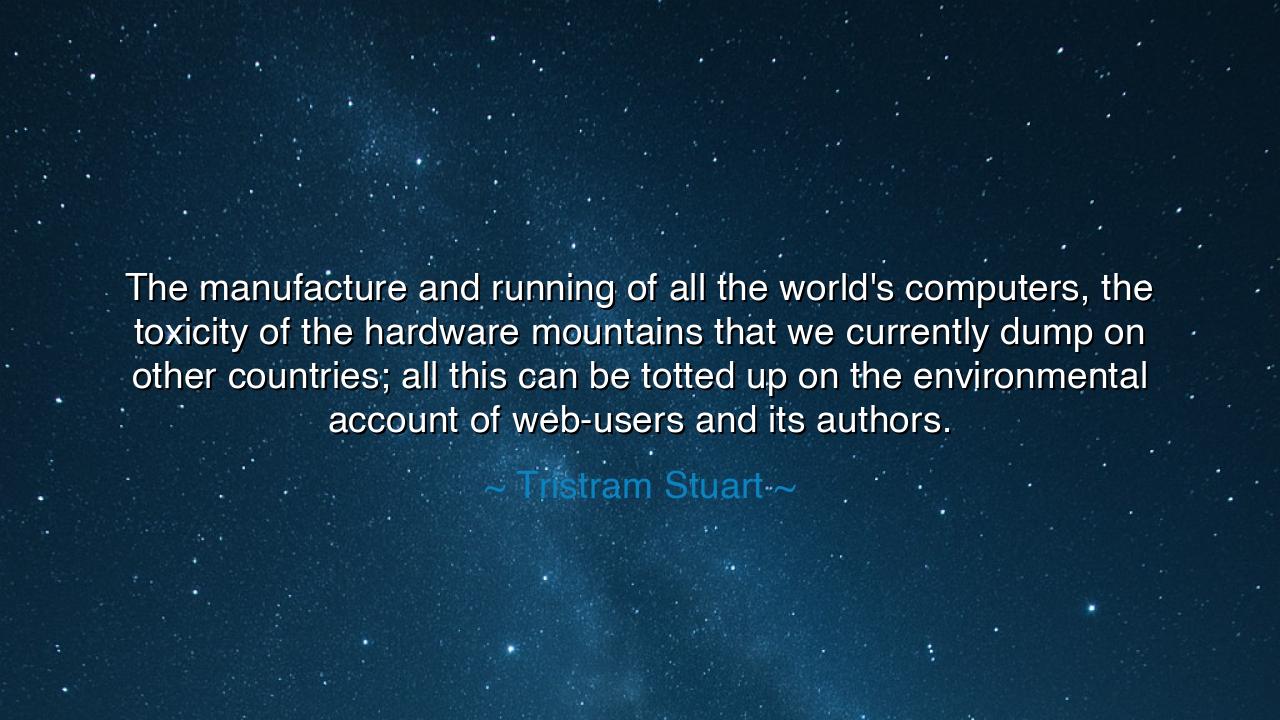
The manufacture and running of all the world's computers, the
The manufacture and running of all the world's computers, the toxicity of the hardware mountains that we currently dump on other countries; all this can be totted up on the environmental account of web-users and its authors.






In the quiet fury of his wisdom, Tristram Stuart spoke these words: “The manufacture and running of all the world's computers, the toxicity of the hardware mountains that we currently dump on other countries; all this can be totted up on the environmental account of web-users and its authors.” This declaration, sharp as a blade and sorrowful as a lament, is no mere criticism of machines — it is an indictment of the hidden cost of our convenience, a mirror held up to the age of digital abundance. Stuart, known for his fierce advocacy against food waste and environmental destruction, here extends his vision to the unseen waste of the digital realm — the ecological price of our screens, servers, and ceaseless connectivity. His words remind us that progress, when pursued without humility, becomes its own form of pollution.
To understand the meaning of his warning, we must first uncover its origin in the age of the machine. In the twenty-first century, as the world became bound by the web, every message, image, and search seemed to float in the ether — light, weightless, immaterial. Yet, as Stuart reminds us, this illusion of weightlessness is a lie. Behind every glowing screen stand vast fortresses of metal and fire — data centers, powered by coal and oil, cooled by rivers and oceans. The computers that connect us are born of rare earths and heavy metals, mined from the scarred faces of distant lands. And when they die, they do not vanish; they return as poison, heaped upon the soil of poorer nations, where children sift through their ashes for fragments of copper and gold.
This is the toxic mountain Stuart speaks of — the graveyard of our modern age. It is not made of stone, but of discarded dreams: shattered screens, corroded motherboards, and forgotten machines. Each new phone, each faster processor, adds to this silent pile. The convenience of one generation becomes the contamination of the next. In this, his words strike a moral chord: the pollution of technology is not an accident, but an act of forgetfulness. We have severed our sense of consequence, believing that what disappears from our sight disappears from the world. But the ancients knew better — that nothing truly vanishes, only transforms. The ashes of excess always find their way home.
Consider the story of Agbogbloshie, a vast dumping ground on the outskirts of Accra, Ghana. Once a fertile plain, it is now one of the world’s largest e-waste sites, where the remains of Western technology — computers, televisions, smartphones — lie broken and burning. Children, barefoot and unmasked, pick through the wreckage, melting wires to extract precious metals, breathing in smoke laced with lead and mercury. They are the unacknowledged custodians of our waste — the silent inheritors of our digital age. This is the human face of the “environmental account” that Stuart names. It is the moral debt written in the soot of our convenience.
Yet, his words are not only condemnation; they are also invitation — a call to awaken from our moral sleep. For he does not say that technology itself is evil, but that its makers and users — the “web-users and its authors” — must learn to see the full circle of their actions. To use a computer is not merely to press a key; it is to join a vast chain of production and consumption, of mining and waste, of energy drawn and life spent. Awareness is the first act of redemption. Once we recognize that the digital world has a footprint, we can begin to tread more gently upon the earth that bears it.
The ancients would have understood this lesson well. In their wisdom, they practiced reverence for what they created, knowing that all power — whether of fire, metal, or thought — carries responsibility. The smith who forged the sword also bore the duty to wield it with restraint; the scribe who wrote the record knew his words would shape generations. So too must we, the children of the digital forge, learn to temper our innovation with accountability. Let us design machines that endure, recycle what we discard, and power our networks not with destruction, but with the light of renewable strength.
And to you who read these words, take them as both reflection and resolve. Do not turn away from the unseen cost of your conveniences. Choose devices that last, repair rather than replace, support the makers who honor the earth. Be a conscious creator, not a careless consumer. For the legacy of the web will not be measured by its speed or its reach, but by whether it uplifted life or diminished it.
In this lies the timeless wisdom of Tristram Stuart’s words: that every act of creation, no matter how modern, is bound to the eternal balance of giving and taking. The machine is but a mirror of its maker — if we fill it with greed, it will devour the world; if we fill it with grace, it will help sustain it. The choice is ours, as it always has been. The web may connect us across continents, but the earth connects us across generations. Let us honor that bond, and ensure that the mountains we leave behind are not of waste, but of wisdom.






AAdministratorAdministrator
Welcome, honored guests. Please leave a comment, we will respond soon